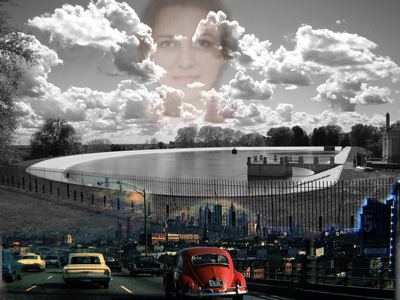Page 1 Page 2 Page 3 Page 4 Page 5 Page 6
“Didn’t that man bother you?” Anna asked as we descended the stairs.
“I don’t give a damn about such people. He’s a fashionable fool. The academy produces armies of them.”
“But he’s helping to hide the truth.”
“As I said, he’s a fool. Sure—he’ll get his grant from the government or the Ford Foundation or somebody and complete his thesis proving the cow jumped over the moon. Then he’ll be poked and prodded by a faculty, whose ignorance has been similarly honed, and get his doctorate. Then, soon enough, he’ll fall out of fashion, and the next wave of dogmatists will be in vogue.”
“Who will answer them?”
“Who knows?—who cares?”
“Someone should answer them.”
“It’s a free country, Anna. Everyone has the right to be their own kind of fool. Of course, there are those who exercise that right far too often—like me, for instance.”
“Why do you try to be less than you are?”
“So I don’t bite my nails over The Great Issues That Confront Us All.”
We stopped at my apartment so I could get my coat. After I put it on, I hugged Anna and kissed her lips.
“Why so affectionate all of a sudden?” she asked.
“Well—it’s Friday.”
“Let’s go.”
“We have a whole weekend ahead of us.”
“Let’s go.”
When we reached my car, an unobtrusive Plymouth Valiant, I paused and took a deep breath. The night was cold, but not bitterly so, and in the clear sky, there hung a big lantern of an October moon. My apartment building—long, white shingled, with a dark gabled roof—resembled a great ark drifting through the stars. Across the street lay the sprawling city park.
“Let’s take a walk,” I said. “I need to clear my head.”
“All right—but don’t lead me astray.”
“I’m stung by the suggestion.”
We walked arm-in-arm onto the earthen shoulder and into the rolling gray of the park. I felt the soft ground under my feet. It gave life to my legs.
“Let’s run,” I said and took off up the hill toward the reservoir.
“Hey, wait for me.”
“Beat you to the reservoir.”
“Look out for that tree.”
“What’s that?”
I ran smack into the tree, bounced off, and landed flat on my back. Anna came running and knelt beside me. “Terry—are you hurt?”
“I ache for you, Anna.”
“Let’s go.”
“Kiss me,” I said pulling her down. We kissed for a remarkably long time. “Let’s make love under the stars.”
“You’re just a little drunk.”
“Don’t change the subject.”
“Beat you to the reservoir,” she said and jumped to her feet and ran away.
“Come back.”
She stopped long enough to pull off her shoes and then resumed her run, shoes in hand, long hair flying. I dragged myself onto my feet and started to jog, running faster as the pain in my knee receded. Reaching the iron fence surrounding the reservoir, I found Anna leaning happily against it, caught up in this gambol that had replaced sex.
“Do all Hungarians run like Zatopek?” I asked.
“He’s a Czech.”
The waters of the reservoir rippled in the moonlight. The breeze was cold on my face. “Let’s walk.”
“Let’s run,” she said.
“Oh, no.”
She ran away again, down, down the hill with me trailing in my survival jog. Down we went into the park’s amphitheater, down between the rows of benches, finally stopping near the foot of the stage. By the time I reached Anna, she was back in her shoes. I was about to speak, when I had a sudden, ghastly feeling. Was I going to be sick? I took a long breath. The crisis passed.
“Ah—a stage.” I said, happy to be well again.
“Terry, what are you doing?”
With my hands on the edge of the stage, I pulled myself up and managed to climb onto it. I pulled Anna up beside me, and for a while, we stood very close.
“Shall we dance?” I said, and we danced as I hummed a waltz.
“I didn’t know you could waltz,” she said as I whirled her around the stage.
“Oh, yes—I’m a born gigolo. Would you care to tango?”
“I’ll try. I haven’t tangoed since the old country.”
We did a splendid tango, after which I bowed to an imaginary audience and turned back to find her gone. She reappeared at the foot of the stage.
“All right, then,” I said. “If you don’t want to dance, I’ll try some ballet moves. Watch my grand jete.”
“Terry—be careful.”
I fell off the stage. That is, I leapt off the stage, and halfway through the leap, it turned into a fall. But the ground yielded, and I landed on my meatier parts. Once again, Anna knelt beside me as I lay flat on my back.
“Are you all right?” she asked.
“Yes, fine, fine, a few contusions, possible internal injuries. Let’s call it an evening.”
I drove Anna home without wrecking the car, and we said good night at the door. Through some miracle of patience, she still wanted me to call, and I said I would do so—soon.
I didn’t always call in those days, even when I promised. Obedient to Father, I rarely squandered money, but I did manage to squander opportunities with women. Perhaps I was too lazy to be a collector, or too concerned about falling for some fortune hunter. Yet, early the next week, I did call Anna. We went out that Friday night for drinks and dinner and some arty French movie I hardly remember. Later we stopped at the Cafe New York, whose proprietor, a squat Sicilian, played the piano and sang like Wingy Manone. We had drinks at a candle-lit table as he played and sang and the smoke from our cigarettes curled upward in the orange light.


